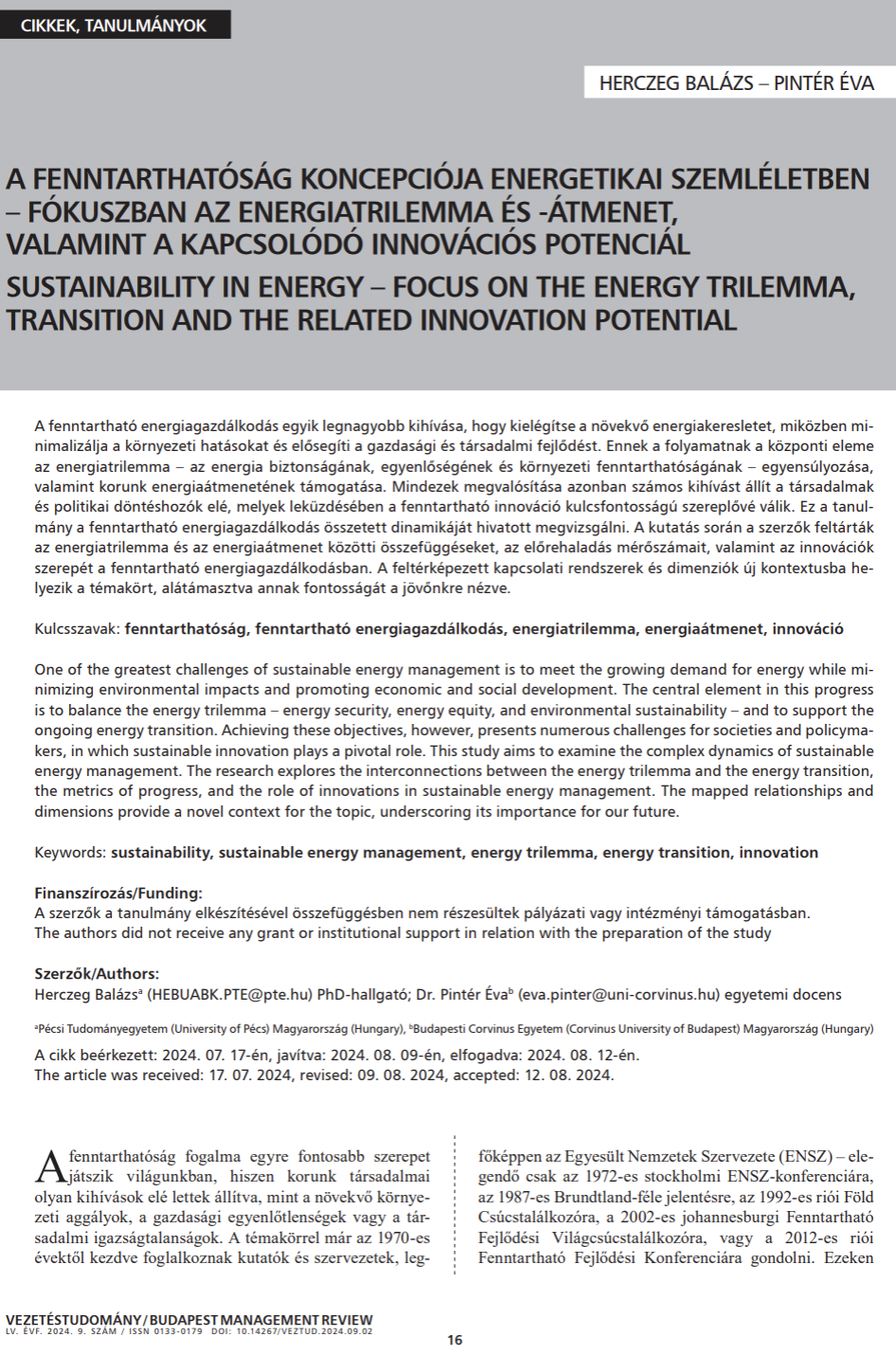Sustainability in energy
Focus on the energy trilemma, transition and the related innovation potential
DOI:
https://doi.org/10.14267/VEZTUD.2024.09.02Keywords:
sustainability, sustainable energy management, energy trilemma, energy transition, innovationAbstract
One of the greatest challenges of sustainable energy management is to meet the growing demand for energy while minimizing environmental impacts and promoting economic and social development. The central element in this progress is to balance the energy trilemma – energy security, energy equity, and environmental sustainability – and to support the ongoing energy transition. Achieving these objectives, however, presents numerous challenges for societies and policymakers, in which sustainable innovation plays a pivotal role. This study aims to examine the complex dynamics of sustainable energy management. The research explores the interconnections between the energy trilemma and the energy transition, the metrics of progress, and the role of innovations in sustainable energy management. The mapped relationships and dimensions provide a novel context for the topic, underscoring its importance for our future.
Downloads
References
Aranyossy, M. (2011). Az információtechnológia üzleti értékének nyomában. Hitelintézeti Szemle, 10(6), 554–574. https://unipub.lib.uni-corvinus.hu/1218/1/HSZ_0611_554_574_Aranyossy.pdf
Azfal, M. (2023). 15 Biggest Renewable Energy Companies in Europe. Yahoo Finance [Online.] https://finance.yahoo.com/news/15-biggest-renewable-energy-companies-230346306.html
Brown, A., Beiter, P., Heimiller, D., Davidson, C., Denholm, P., Melius, J., Lopez, A., Hettinger, D., Mulcahy, D., & Porro, G. (2016). Estimating Renewable Energy Economic Potential in the United States. Methodology and Initial Results. https://doi.org/10.2172/1215323
Bukovics, I., Besenyei, M., Földi, L., & Rakonczai, É. (2014). Felelős gazdálkodás: A fenntarthatóság gazdálkodási vonatkozásai. Nemzeti Közszolgálati Egyetem. https://tudasportal.uni-nke.hu/xmlui/bitstream/handle/20.500.12944/100372/46.pdf?sequence=1&isAllowed=y
Caradonna, J.L. (2022). Sustainability: A history. Oxford University Press.
Deutsch, N. (2013). Fenntartható innovációk rendszerinnovációs potenciáljának vizsgálati keretrendszerei. In Inzelt A. & Bajmócy Z. (szerk.), Innovációs rendszerek: Szereplők, kapcsolatok és intézmények (pp. 196– 215). JATEPress.
Dinya, L. (2010). Biomassza-alapú energiatermelés és fenntartható energiagazdálkodás. Magyar Tudomány, 171(8), 912–925. https://www.epa.hu/00600/00691/00080/pdf/mtud_2010_08_912-925.pdf
Energy Institute. (2023). Statistical Review of World Energy 2023. Energy Institute. https://www.energyinst.org/_data/assets/pdf_file/0004/1055542/EI_Stat_Review_PDF_single_3.pdf
ENSZ Környezetvédelmi Programja (2023). Green Finance Case Stueid in Energy and Industry. https://www.unepfi.org/industries/banking/energy-and-industry-green-finance-case-studies/
EUR-Lex. (n.d.). Az EU jogszabályainak összefoglalása. Fenntartható fejlődés. Publication Office of the European Union. https://eur-lex.europa.eu/HU/legal-content/glossary/sustainable-development.html
Fouquet, R., & Pearson, P. J. G. (2012). Past and prospective energy transitions: Insights from history. Energy Policy, 50, 1–7. https://doi.org/10.1016/j.enpol.2012.08.014
Goswami, D. Y., & Kreith, F. (2017). Energy Conversion (2nd ed.). CRC Press.
Gunnarsdottir, I., Davidsdottir, B., Worrell, E., & Sigurgeirsdottir, S. (2021). Sustainable energy development: History of the concept and emerging themes. Renewable and Sustainable Energy Reviews, 141, 110770. https://doi.org/10.1016/j.rser.2021.110770
Gyulai, I. (2012). A fenntartható fejlődés. Ökológiai Intézet a Fenntartható Fejlődésért Alapítvány.
Herczeg, B., Pintér, É., & Bagó, P. (2023). How green and digital transformation shapes industries. Vezetéstudomány/Budapest Management Review, 54(5), 51–63. https://doi.org/10.14267/VEZTUD.2023.05.05
IEA, IRENA, UNSD, Bank, W., & WHO. (2023). Tracking SDG7. The Energy Progress Report 2023. International Energy Agency. https://reliefweb.int/report/world/2023-tracking-sdg7-report-enarruzh?gad_source=1&gclid=Cj0KCQjwrKu2BhDkARIsAD7GBoudR-TMVCCO-Uyntzo4QxAFtrA9P1WN1WjJnIGvcvLSLurTW2QhemkaAvljEALw_wcB
International Atomic Energy Agency. (2000). The Annual Report for 1999 (Vol. GC(44)/4). http://www.iaea.org/worldatom
International Atomic Energy Agency. (2002). Indicators for sustainable energy development (Vols. 02-01570/). https://www.iaea.org/sites/default/files/indicators.pdf
International Atomic Energy Agency. (2005). Energy Indicators for Sustainable Development: Guidelines and Methodologies. International Atomic Energy Agency. http://www.iaea.org/Publications/index.html
International Atomic Energy Agency. (2007). Energy Indicators for Sustainable Development: Country Studies on Brazil, Cuba, Lithuania Mexico, Russian Federation, Slovakia and Thailand. https://www.un.org/esa/sustdev/publications/energy_indicators/full_report.pdf
International Energy Agency. (2019). Energy Transitions Indicators. https://www.iea.org/articles/energy-transitions-indicators
Mihić, M.M., Dodevska, Z.A., Todorović, M.L., Obradović, V.L., & Petrović, D.Č. (2018). Reducing Risks in Energy Innovation Projects: Complexity Theory Perspective. Sustainability, 10(9), 2968. https://doi.org/10.3390/su10092968
Miller, C.A., Richter, J., & O’Leary, J. (2015). Socio-energy systems design: A policy framework for energy transitions. Energy Research & Social Science, 6, 29–40. https://doi.org/10.1016/j.erss.2014.11.004
Molnár, S. (2021). Energetikai alapismeretek. Magyar Mérnöki Kamara.
Munasinghe, M. (2004). Sustainable Development: Basic Concepts and Application to Energy. In Encyclopedia of Energy (pp. 789–808). Elsevier. https://doi.org/10.1016/B0-12-176480-X/00441-1
Munkácsy, B. (2018). Energiaföldrajz és energiatervezés. Eötvös Loránd Tudományegyetem, Természettudományi Kar, Földrajztudományi Központ.
Prandecki, K. (2014). Theoretical Aspects of Sustainable Energy. Energy and Environmental Engineering, 2(4), 83–90. https://doi.org/10.13189/eee.2014.020401
Rybak, A., Rybak, A., & Kolev, S.D. (2021). Analysis of the EU-27 Countries Energy Markets Integration in Terms of the Sustainable Development SDG7 Implementation. Energies, 14, 7079. https://doi.org/10.3390/en14217079
Schiederig, T., Tietze, F., & Herstatt, C. (2012). Green innovation in technology and innovation management – an exploratory literature review. R&D Management, 42(2), 180–192. https://doi.org/10.1111/j.1467-9310.2011.00672.x
SE4ALL. (n.d.). Our work. https://www.seforall.org/our-work
Smil, V. (2017). Energy Transitions: Global and National Perspectives (2nd ed.). Praeger.
Smil, V. (2018). Energy and Civilization. MIT Press.
Sovacool, B. K. (2016). How long will it take? Conceptualizing the temporal dynamics of energy transitions. Energy Research & Social Science, 13, 202–215. https://doi.org/10.1016/j.erss.2015.12.020
Statista (2023). Global Investment in Energy Transition 2004-2022 [Online]. https://www.statista.com/statistics/1201435/global-investment-in-energy-transition/
Tester, J. W. (2012). Sustainable energy: Choosing among options (2nd ed.). MIT Press.
United Nations Development Programme. (2000). World Energy Assessment: Energy and the Challenge of Sustainability. United Nations. https://www.undp.org/publications/world-energy-assessment-energy-and-challenge-sustainability
United Nations Statistical Commission. (2017). Global indicator framework for the Sustainable Development Goals and targets of the 2030 Agenda for Sustainable Development Goals and targets (Issue A/RES/71/313).
World Commission on Environment and Development. (1987). Our common future. Oxford University Press.
World Conference of Scientific Academies. (2000). IAP Statement on Transition to Sustainability. https://www.interacademies.org/statement/iap-statement-transition-sustainability
World Energy Council. (n.d.). Our History. https://www.worldenergy.org/centenary/our-history
World Energy Council. (2008). Assessment of Energy Policy and Practices. World Energy Council. https://www.worldenergy.ch/file/Publikationen/Aktuell/Assessment_Energy_Policy_Practices.pdf
World Energy Council. (2011). Policies for the future. 2011 Assessment of country energy and climate policies. World Energy Council. https://www.worldenergy.org/assets/downloads/PUB_wec_2011_assessment_of_energy_and_climate_policies_2011_WEC.pdf
World Energy Council. (2016). World Energy Trilemma Index 2016. Benchmarking the Sustainability of National Energy System. World Energy Council. https://www.worldenergy.org/publications/entry/2016-energy-trilemma-index-benchmarking-the-sustainability-of-national-energy-systems
Zlinszky, J., & Balogh, D. (2016). Világunk átalakítása. A fenntartható fejlődés 2030-ig megvalósítandó programja. Pázmány Press.

Downloads
Published
How to Cite
Issue
Section
License
Copyright (c) 2024 Copyright (c) 2024 Corvinus University of Budapest, publisher of Vezetéstudomány / Budapest Management Review

This work is licensed under a Creative Commons Attribution 4.0 International License.
Authors assign copyright to Vezetéstudomány / Budapest Management Review. Authors are responsible for permission to reproduce copyright material from other sources.

